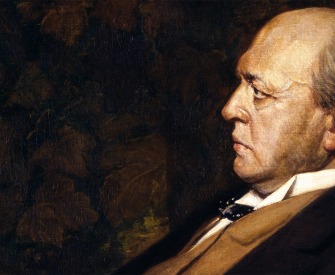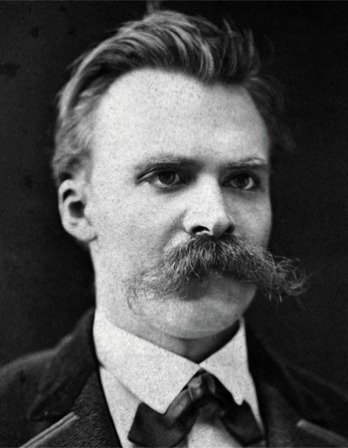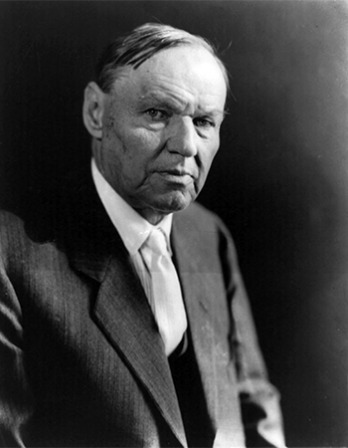Let us have peace, but let us have liberty, law, and justice first.
—Frederick Douglass, 1878The Daimons’ Wisdom
How do you preserve the rule of law when tyranny is on the rise? Lessons from the Florentine republic.
By Erica Benner

Illustration from Thomas Hobbes’ Leviathan, attributed to Wenceslaus Hollar, 1651. British Library.
Audio brought to you by Curio, a Lapham’s Quarterly partner
Chancellor Bartolomeo Scala was a pragmatic man. A miller’s son from the provinces, he had studied law in Florence and beat out jealous rivals to become the Florentine Republic’s top civil servant. His position made him rich enough to buy one of the grandest houses in a city where, in the 1470s, new mansions were springing up on every street corner. And he had earned his success. Under his astute watch, Florence prospered more than ever before. The city’s financial services were sought throughout Europe. Wagons loaded with homemade and foreign luxury goods clattered daily through its streets.
Yet despite all this fortune, Scala worried about the city’s political and moral health. Its citizens were proud of their rare form of government, a self-governing republic in which a cross section of male residents sat on key councils, held high-ranking political posts, and debated matters of war and peace. Florentines shared the ancient Romans’ belief that a free people could have only one ruler, the law. Human kings were anathema in Florence. The law—rules set above the weak and powerful, rich and poor, leaders and led, subjecting all to their equalizing yoke—was revered as kingly and divine. But now its sacred shackles were coming undone. One family of wealthy bankers, the Medici, had found ways to sidestep laws designed to keep Florence’s republic—from the Latin res publica, meaning “public thing”—from becoming the private property of one man or clan. Buying loyalty with loans and favors, the Medici packed the government with yes-men who rewrote inconvenient laws or brushed them aside. Chancellor Scala himself had often played yes-man-in-chief. And though Florence still bore the name of republic, no one doubted that the city and its laws were de facto subjects of one man, Lorenzo “the Magnificent” de’ Medici.
Had the time come for Florentines to admit that laws no longer ruled in their city—and to ask themselves whether this might be a good thing? No Florentine dared to broach such questions directly. To do so would amount to sacrilege, or treason. So Bartolomeo Scala raised it in a roundabout way in his 1483 Dialogue on Laws and Legal Judgments, dedicated to Florence’s princely leader.
The text’s conversation takes place by the fireside in Scala’s own home. A friend has brought the gout-ridden chancellor his notes on a debate between celebrated jurists. When this visitor recalls that a parchment codex of Roman laws is held as a treasure in the government chapel, Scala demands to know: But are we right, after all, to venerate written laws? Why shouldn’t we follow the example of the Spartans? They avoided endless lawsuits by simply doing whatever the wealthiest citizens decided. Another well-known substitute for laws, he points out, is the judgment of a prince or his proxies. The Turkish sultan delegates full judicial powers to pashas, who decide criminal cases without written laws. The defendants have no attorneys and no right of appeal. So the people are spared expensive litigation and the greed, self-importance, and soul-deforming hypocrisy one sees in our Florentine jurists. If a pasha takes bribes or lets personal interests warp his judgment—Scala clearly relishes this next thought in a mischievous, metaphorical way—the sultan’s men thrust a stake into his bowels, raise him high in the air, and hurl him skewered to the ground. In any case, concludes the chancellor in a less colorful vein, the best laws come from nature. Surely we should trust a few good men to grasp natural laws more truly than the low-life tribe of lawyers?
The dialogue then gives the floor to its only other speaker, the man cast as defender of the law: Scala’s close friend Bernardo Machiavelli. (An obscure but highly trained jurist, Bernardo was also father of then-fourteen-year-old Niccolò Machiavelli, who three decades later would dedicate an even more unsettling work to the Medici, the book of political advice we know as The Prince.) If we could find one or a few trustworthy men to make and apply our laws, Bernardo agrees with Scala, that would save the rest of us a lot of trouble. But even the wisest people disagree about what is just or unjust by nature. We have no choice but to make laws by common agreement, and to take whatever pains we must to try cases as fairly as we can.
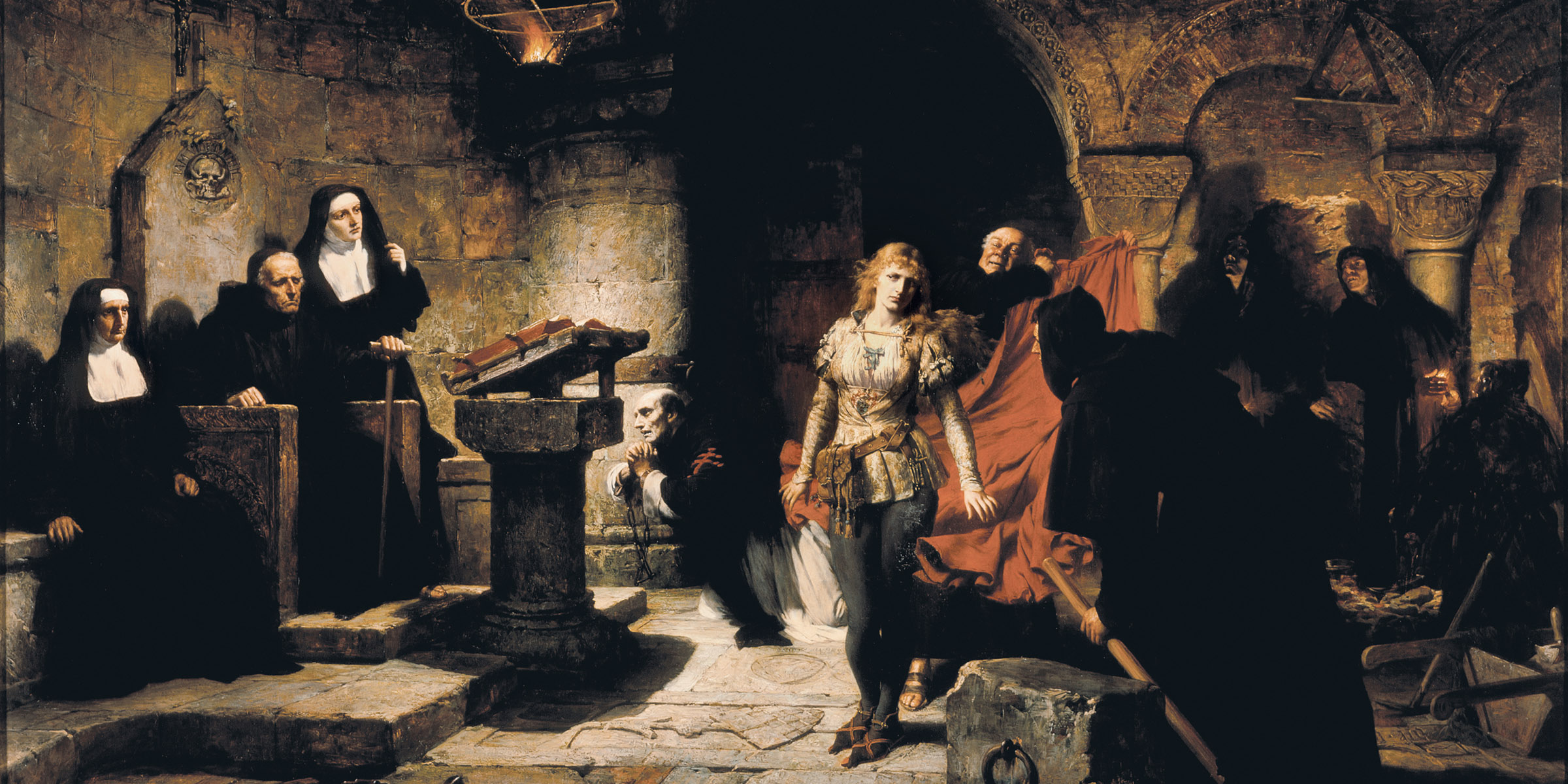
The Trial of Constance de Beverly, by Toby Edward Rosenthal, c. 1883. Los Angeles County Museum of Art, Gift of Joseph J. Szymanski in memory of Renate Lippert Szymanski (AC1993.233.1).
Here Bernardo calls on philosophy for support. Nearly two millennia earlier, Plato’s dialogue the Statesman had posed Scala’s question: If someone comes along who possesses the “kingly science” of legislating, wouldn’t it be absurd not to let him rule, pushing law aside? But then again, Plato’s speaker continues, we’d be hard-pressed to find anyone whose knowledge of human affairs is so perfect that we could trust him with the entire business of ruling. We have to settle for the next best thing: an imitation of the rule of the superwise wrought “by coming together and making written laws.”
Scala’s dialogue makes Bernardo’s defense of the law soar, while the chancellor’s own devil’s advocacy of pashas and enlightened autocrats falls to dust. Scala does not paint his friend’s arguments as naive. On the contrary, he has the elder Machiavelli outline a realistic psychology of power that shows why laws should rule even the best leaders: “All too often we see how immoderate desires dominate those who hold the reins of power,” so that they turn human affairs into an endless battle for precedence, reputation, and riches. Here again Bernardo echoes Plato, this time the philosopher’s dialogue the Laws, fountainhead of most later ancient and early modern thinking about the rule of law. The worst form of ignorance, Plato tells us, is conceit of one’s own wisdom, which takes the most extreme forms in the very powerful and rich. Any man who thinks “he can play the leader to others” without laws to guide him, Plato’s main speaker says, “has been deserted by God.” Though “many people think he cuts a fine figure,” before long he “brings himself, his home, and his state to rack and ruin.”
However harmless a thing is, if the law forbids it, most people will think it wrong.
—W. Somerset Maugham, 1896This was also Chancellor Scala’s sotto voce message to Lorenzo de’ Medici. Scala may have played a part in debasing Florence’s laws in the past, but now he hoped that his dialogue might move Florence’s tyrant-in-the-making to reverse course. Without laws, he has Bernardo Machiavelli say, “cities and states” are “nothing but bands of robbers” where the cunning and violent harass the rest. Good laws are our mightiest arms. By setting bounds to self-love, they help win us friendships, which in turn help bring victories to our troops and triumphs at home. And as Plato said, if anyone should claim to be an expert whose political knowledge is superior to the laws, “such a person must be called a tyrant.”
A decade later, in 1494, the Medici were declared tyrants and expelled from Florence. A popular government was refounded on the ancient republican principle that “among us no one but the laws is king.” Amnesty laws were passed to check popular desires for vengeance against old Medici amici. Strict procedures for criminal trials were put in place with a view to ensuring that crimes against the state—those that merited the stiffest penalties of exile or, more rarely, death—would be tried with the utmost care. The several thousand citizens who drafted and approved these laws knew that suspicions always run high after a constitutional crisis. Their legal system was supposed to make people thoroughly inspect evidence before acting on mere suspicions, or even reasonable fears.
The new laws soon came under fresh attack. Their assailants were not overreaching leaders but men from rival sections of the popolo, the liberated, self-ruling people. Florentines had a talent for sprouting factions, and in the first flush of freedom they went straight for the throat: suspected Medici henchmen versus the exiled family’s enemies, defenders of popular government versus patricians who preferred oligarchy, friends of the city’s military commander versus those who called him a turncoat. Leaders of all these factions had few qualms about rejecting due process to save friends and hurt foes. Several high-profile men were executed on trumped-up charges without a fair trial, or with no trial at all. The most damaging case involved a forced confession from a Dominican friar, Girolamo Savonarola, who had urged his followers to capture the republic’s laws for God and legislate an ascetic morality. Savonarola’s death by fire in Florence’s lovely central piazza ended his crusade. But the prosecutors’ methods made Florentines lose faith in the claim that the republic’s laws were transparent, unselfish, and dispassionate.

Piedras Blancas, by Miguel Angel Ríos, 2014. Color print, 26 x 39 3/8 inches. © Miguel Angel Ríos, courtesy of the artist and Gallery Wendi Norris, San Francisco.
Niccolò Machiavelli lived through these political tempests. As the city’s second chancellor and secretary to the Ten of War, the body in charge of Florence’s defense, he watched the republic collapse and the Medici return in a coup after only eighteen years. Yet he never stopped insisting that without the rule of law, human life was far worse than that of beasts. All states, Machiavelli says in his Discourses on Livy, whether monarchies or republics, “have need of being regulated by law. For a prince who can do whatever he wants is crazy, while a people who can do whatever it wants is not wise.”
His point has nothing to do with the oligarch’s sneer that the demos is too dim to govern. Nearly three centuries before Thomas Paine and Thomas Jefferson, Machiavelli had held that self-governing peoples—whether or not they are “shackled by laws”—are less likely to judge crazily than princes or elites. But Machiavelli, unlike direct democrats and populists, says that republics need kinglike laws to check the onset of democracy’s signature disease: civil divisions that turn to extreme partisanship. Democracy purports to give equal voice to people with clashing interests and values, thereby protecting citizens’ freedom to think differently from the majority or the ideology of a one-party state. But these clashes need to be kept in bounds or they destroy the polity. Good laws form this essential restraint, setting limits to what can be done within shared public space. When party rivalries stay within these limits—here Machiavelli challenges the common opinion that all conflicts are bad for civic union—they help keep democracies robust. They become toxic when fear or intensified conflict makes partisans forget that they have to coexist with rivals—when they turn a blind eye to corruption in their own ranks and cheer or shrug when their leaders beat civility to a pulp in the hope of crushing opponents.
Florence’s anti-Medici republic died young because its conflict-regulating laws were not strong enough. But what kinds of laws keep healthy tumults from becoming poisonous? Those that guarantee equal opportunity to take part in government and hold public posts regardless of party, wealth, or connections. Machiavelli had nothing but contempt for established elites who claimed they were more qualified to govern republics than non-elite citizens. Likewise, his notion of republican justice forbade persecuting individuals just because they were upper-class. If the more “popular” party in a republic refused to share authority with worthy men from backgrounds it branded as elite, these men would have reasonable cause to complain and destabilize the republic. Punishment or reward based on group affiliation rather than individual deeds and qualities undermines the rule of law. When that happens, the republic’s ruin is only a matter of time.
The more corrupt the state, the more numerous its laws.
—Tacitus, 110Machiavelli’s point was that lawmakers and judiciaries must treat legal impartiality as sacrosanct, urging citizens to let it rule them more than party passions. But he knew how readily people relax this standard when their party or country feels embattled. The Medici were good at invoking alleged threats to Florence’s existence as a pretext for extralegal shortcuts. The successor republic was clumsier, but did the same thing. Despite his reputation for being a realist who thought political necessity excuses breaches of laws and justice, Machiavelli actually said the opposite. He agreed with his father—at least as Scala portrayed Bernardo—that the laws and justice are a state’s best security. A recurring Machiavellian theme is that law is useless without good arms, and conversely, you can’t have good arms without just law and transparent legal procedure. One of the republic’s most shocking snubs to justice involved the execution of its army chief on flimsy suspicions of bribery. Rumor had it, Machiavelli later recalled, that Captain Paolo Vitelli had lost a key military campaign “because he had been corrupted.” But Vitelli had had no chance to defend himself, “because there were no procedures in the republic that enabled him to do so.” If there had been, “the infinite scandals that occurred” in Florence “would not have occurred.” The ancient Romans had been “more merciful and more hesitant” in their punishment than Florentines. Even if a captain caused trouble through malice, “they punished him humanely,” with fines. They did so because they believed that leaders of armies worked best with “a free and ready spirit,” without having to fear decapitation at the first suspicion of error or misconduct.
Laws constitute good arms in various ways. Strict impartiality preserves civil trust. Punitive laws against calumny make captains feel safe enough to take risks in battle. And it’s crucial for security that no individual be denied a proper trial or right of appeal, no matter how serious a threat they might pose to the republic. Machiavelli, infamous for supposedly coining the realist maxim “The ends justify the means”—though he never wrote those words—liked to make readers think hard about how illegal and unjust means corrupt well-meaning ends. Speaking of an ancient Roman politician charged with serious political crimes but denied an appeal, Machiavelli writes that his “criminal life merited every punishment.” “Nonetheless,” he goes on, “it was hardly a civil thing to violate the laws” by punishing him without due process. This set up “a wicked example” that fatally compromised Rome’s political order. For “if one sets up a habit of breaking the orders” and ignoring an individual’s lawful claims for the sake of collective safety or some other, greater good, “then later, under that coloring, they are broken for ill.”
But are well-crafted laws enough to keep the rule of law fit to regulate democracy’s skirmishes? In today’s fractious liberal democracies, the answer seems a clear no. Partisan excess and tyrannical ambitions are not the only things that rob laws of their power. Grotesque inequalities of wealth and access to public goods do this as well.
Classical champions of the rule of law grasped this nettle more boldly than most people do today. They saw that even perfect laws need to be planted in healthy soil or they will go to rot. Plato saw disparities of wealth as one of the deepest threats to the integrity of law. Legislators, he said, need to be like good doctors who help citizens take a holistic view of their civic body and maintain its healthy balance.
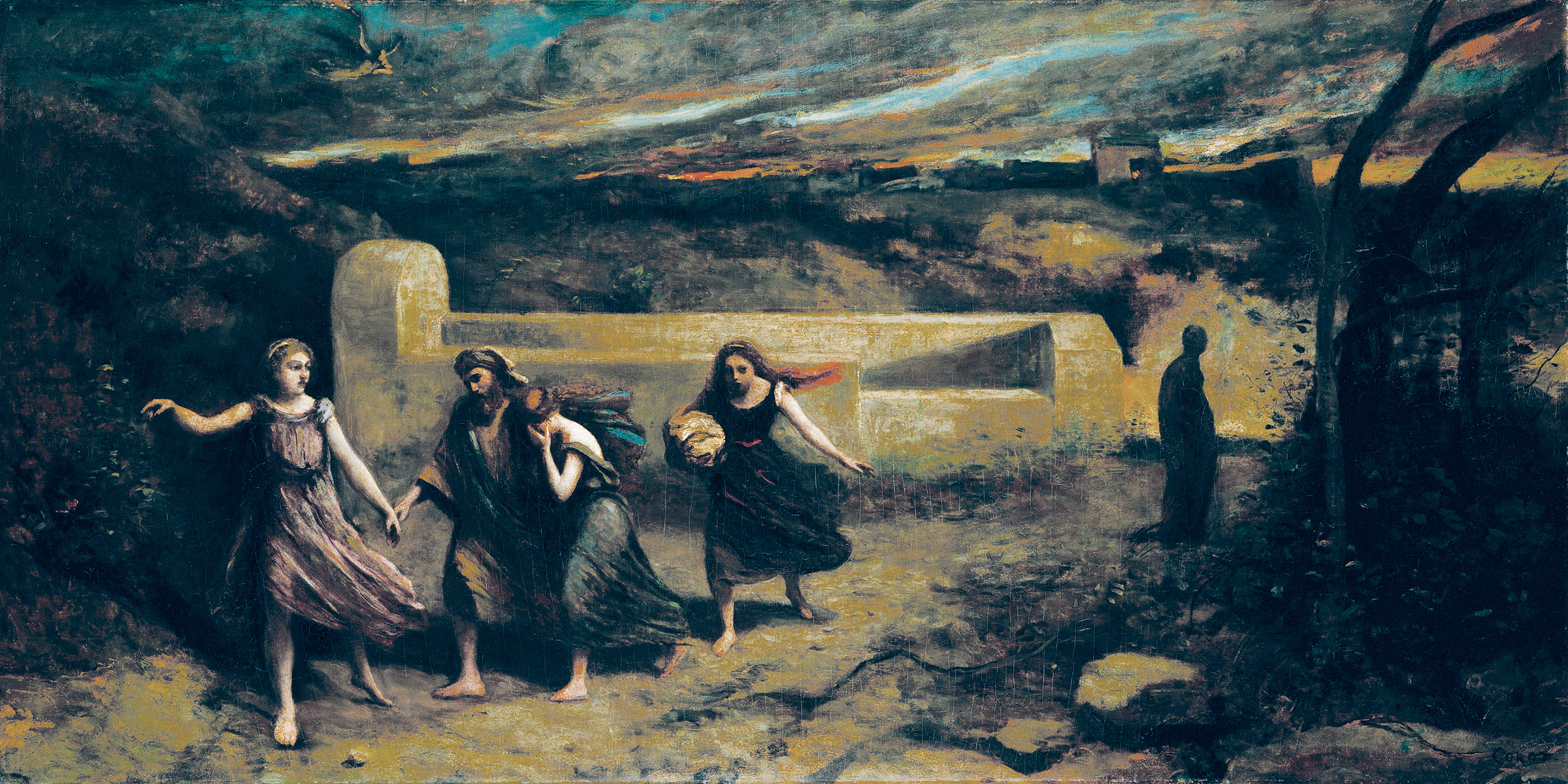
The Burning of Sodom, by Camille Corot, 1857. The Metropolitan Museum of Art, H.O. Havemeyer Collection, Bequest of Mrs. H.O. Havemeyer, 1929.
Machiavelli agreed. To keep laws in good ruling order, he tells his readers, democracies need to preserve an “even equality” among citizens’ opportunities, wealth, and status. Excessive inequality makes it easier for the wealthy few to dominate the rest and makes the poor feel—with reason—that the system is stacked against them. Machiavelli learned from the history of Florence that violent partisanship, the main enemy of law in a democracy, feeds on gaping disparities of wealth and social respect. Laws aimed at containing partisan extremes are disarmed by inequality.
In the nineteenth century Karl Marx went a step further. No society, he argued—including liberal capitalist societies—has ever had the fair and equal law that their apologists claim to revere. The formal impartiality of law is nothing but a facade, part of a superstructure that whitewashes the exploitation of the many by the few. Machiavelli and Plato would agree that most legal systems have not made life hard enough for the exploiting class. While resisting Marx’s arch-skeptical view of laws, they anticipated his analyses of the layers of belief, identity, mentality, and feeling that make it so hard to tackle inequality. In hypercompetitive trading and banking societies—Plato’s Athens, Machiavelli’s Florence, and Marx’s Europe—the mores of the rich tend to sap the broadly egalitarian ethos needed to support the rule of law. Marx called this ideology, a set of beliefs that blinds exploited classes to their own servitude and persuades them that whatever enriches the moneymakers will also be best for them. A century earlier, Jean-Jacques Rousseau speculated that the first states were created when the rich “conceived the most deliberate project that ever entered the human mind”: persuading the poor, using “specious reasons,” to accept “wise laws that protect all members of the association” equally and “maintain us in an eternal concord.”
Yet whereas Marx dismissed such beliefs as false consciousness, an alien imposition that revolution could lift, Rousseau saw how deeply they shape people’s view of their world. People grow so used to competing for unequal stakes that they can’t see how laws could moderate inequality without destroying their way of life. They think they have to play the hypercompetitive game not just because they see no other option but because they’re programmed to want to win the game they’re constantly told is the only one in town. In our time, mass media and marketing have made this truer than ever. Everyone applauds the highest fliers and dreams of becoming like them: making gargantuan profits, earning obscene salaries, owning more houses and castles and luxury vehicles than the lesser ranks of fat cats. To be a star is no longer enough. You have to be, or want to be, a superstar. This hyperbolized view of success makes Machiavelli’s “even equality” look like a loser’s creed—drab, cramped, enterprise-killing.
Thus culture connives with economics to dishonor equality and cripple the rule of law in our democracies. Unsurprisingly, people from society’s insecure middle and lower ranks are often keenest to get an advantage by whatever means possible. Machiavelli relates an episode from Florence’s history when middling citizens who hoped to increase their “honor” elbowed poorer workers out of the guild system that had long protected their economic and political rights. The upshot was a civil war that shattered trust between different classes for centuries and helped the super-rich Medici rise to unseemly power. Machiavelli uses the episode to draw a lesson for future generations: when competition is weakly regulated, the resulting inequalities put a terrible strain on democracy’s promise of equality under the law. He has strong sympathies for the underclass rebels, saying they had been cheated of the justice that the republic owes to everyone. But the right cure for injustice isn’t violent revolution; it’s better laws. For Machiavelli, as for Plato—though the latter was far more egalitarian—economic regulation and redistributive mechanisms were part and parcel of the rule of law.
All law is of necessity defective in the beginning.
—Han Yu, 800Two centuries later, Rousseau agreed that the best remedy for weak laws is to attend to their social, economic, and cultural underpinnings. Though there are far too many examples of laws bowing to wealth and power, there’s no good reason to think that laws are doomed to such an abject existence. “It is to law alone,” he declared, “that men owe justice and freedom.” This is true even if our own times and most of human history make us cry out: “In vain do we seek freedom under the power of the laws. The laws! Where is there any law?” Legal equality may at times be a ploy contrived by the rich to control the rest, but it is still a brilliant idea, one that may be turned to better purposes—and one humans can’t do without.
The problem—perhaps our greatest, never-ending task—is to devise laws that stand a chance of delivering these boons, at least most of the time, and implanting them in propitious soil. Following Plato, Bernardo Machiavelli described good law as an imitation of superhuman wisdom. Where are we to find the image of such wisdom? How can quarrelsome, self-centered people possibly agree on what it looks like? In Florence, Savonarola’s followers thought they discerned its truth in the friar’s prophecies, which he claimed came straight from God. Legislators in turbulent times have often thought that wise laws must be draconian, demanding high levels of conformity, thus terrifying people into obedience. Some republican rule-of-law men, notably Cicero, have looked for an image of divine reason in nature. But as Bernardo said, natural lawyers disagree among themselves about nature’s demands on civil life.
As usual, Plato probed his own problem more deeply than most of his critics. The best legislators, he said, know that no human wisdom will ever give them perfect laws. Abandoning the quest for perfection, they do their conscientious best to work out laws that fit flawed human nature. Such laws avoid penalties so harsh that they terrify or brutalize people or so soft that they never deter crime. Their aim should be to restore health in souls and friendship in cities, not to produce uniformity in belief and action or help the state control citizens. They should treat people as free agents who, however predisposed by nature to break a law, always have a small margin of choice. Seizing on this margin of freedom, the law should engage people’s wills instead of simply stating rules and threatening punishments. Plato’s laws all have preambles that explain, in a style anyone can understand, why it is best to obey the law. When legislators know they need to address free persons with respect and with reason, not force alone, they are more likely to devise laws that stick, because people willingly accept their rule.

Nebula, by Amy Kaufman, 2009. Pastel on paper, two panels, 25 x 38 inches. © Amy Kaufman, courtesy of the artist and Traywick Contemporary, Berkeley.
If the laws are so easy for factions and plutocrats and autocrats to seize, why do we think laws are fit to rule at all? How can so frail a thing as civil law be trusted to protect our livelihoods and our borders, keeping citizens safe from each other’s bad humors? The answer is that laws can rule if we equip them to—but not by themselves. Even the kingliest laws need constant support from citizens who understand their human origins and all-too-human vulnerability. Plato expressed this through a myth. When men first walked the earth, the god Cronos gave them a race of wiser beings, the daimons, as rulers. When that age vanished in the mists of time, human beings made laws in imitation of the daimons’ wisdom, which was second-best after that of the gods. These legislative efforts have always been flawed, often fatally. They are, after all, only a thirdhand imitation of reason and justice. But they are still the best we humans can do.
